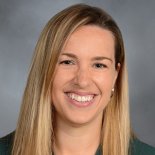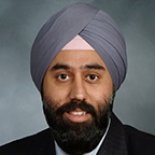

Dr. Susan Loeb-Zeitlin discusses the essential lifestyle changes that can help women in midlife embrace a healthier, happier life. She highlights how nutrition, exercise, and mental well-being play a crucial role in maintaining vitality during midlife and beyond. She provides an overview on the importance of preventive healthcare, routine screenings, and practical guidance for making informed health choices as you navigate the complex transition of menopause.
To schedule with Dr. Susan Loeb-Zeitlin

Dr. Magdalena Lombardi Plasilova discusses the groundbreaking impact of artificial intelligence (AI) in breast cancer diagnosis and treatments. She highlights how AI assists doctors in many ways, including interpreting mammograms and identifying suspicious lesions. She reviews issues concerning bias in AI algorithms and datasets when used in healthcare settings. She gives an overview of the potential of AI in creating personalized and efficient treatment plans for breast cancer patients; ultimately leading to earlier diagnosis and improved outcomes.
To schedule with Dr. Magdalena Lombardi Plasilova, please visit: https://weillcornell.org/plasilova-md

Dr. Michelle Loy discusses integrative health and lifestyle medicine for women through the life stages. She emphasizes the importance of seeking evidence-based care to best address holistic wellness. She provides insights on preventive care and how integrative medicine can assist in navigating these changes as women age.

Dr. Fahey discusses pulsed field ablation, a minimally invasive procedure used in removing benign thyroid nodules. He discusses the effectiveness and benefits of the innovative treatment for select candidates looking to address thyroid issues. He highlights the shared decision-making process that patients should partner with their healthcare provider on for considering PFA. Finally, he highlights why Weill Cornell Medicine is a leader in performing PFA procedures.
To learn more about Dr. Fahey

Dr. Elizabeth Anne Grill discusses the emotional journey that couples can experience during infertility. She offers invaluable insights on coping strategies that foster emotional resilience when feelings of grief, anger, and despair arise. She also delves into actionable advice for friends, family, and partners to provide the empathic support that is crucial during this time.
To schedule with Dr. Elizabeth Anne Grill

Dr. Carolyn Newberry explores the vital role gut health plays throughout our lives. Discover how the microbiome impacts overall well-being, including aspects you may not have considered, such as mental health and mood regulation.
To schedule with Dr. Carolyn Newberry

Dr. Rochelle Joly delves into the revolutionary technique known as vaginal natural orifice transluminal endoscopic surgery (vNOTES). She explains the advantages that this minimally invasive method offers patients; including less pain, faster recovery, and fewer visible scars.

Dr. Bob Harrington discusses the importance of heart-healthy living through the life stages. He highlights the recent alarming statistics around cardiovascular diseases and its prevalence between men and women. He reviews the latest advancements in treating heart health and how Weill Cornell Medicine is leveraging unique technology and innovations to improve patient outcomes. He provides practical advice for lifestyle changes that patients can make to help better reverse health trends.

Dr. Georges Sylvestre highlights guidance for breast cancer screenings for pregnant and postpartum patients. He discusses recent increased occurrences of the cancer in women under 40 and contributing risk factors, like obesity. He gives an overview of recommended ways of detecting the cancer including for patients to know their breasts by recognizing any changes that could happen. He provides an overview of the importance of shared decision making with providers and patients to help prevent and detect breast cancer.
To schedule with Dr. Sylvestre

Dr. Kristen de Vries discusses what patients should know about cancer rehabilitation medicine. At Weill Cornell Medicine, our cancer rehabilitation specialists aim to improve patients’ quality of life using a holistic, empathetic and patient-centric approach. We use holistic cancer treatments, also called complementary or alternative cancer treatments, in conjunction with conventional treatments to address both the physical and emotional needs of our patients.
To schedule with Dr. Kristen de Vries, please visit: https://weillcornell.org/kristen-de-vries-md

Dr. Mariam Ashraf discusses what patients should know about detecting, preventing and treating sports-related injuries. She reviews the common types patients come in for and what can cause issues, like chronic over-use or compounded stress on muscles and joints. She highlights the importance of stretching and warming up before playing sports. She also discusses over-the-counter medications and available treatments for patients looking to manage pain.
To schedule with Dr. Mariam Ashra

Dr. Tiffany Lin discusses what patients should know about Botox treatment for headaches and migraine. She describes how the procedure works by reducing the release of neurotransmitters and proteins that cause triggering inflammation and pain. She highlights the low side effects of the quarterly injections, as compared to other daily dose regiments, and why those impacted by chronic headaches may want to consult their doctors.
To schedule with Dr. Tiffany Lin: https://weillcornell.org/tiffany-lin-md

Dr. Natalie Tintin Cheng discusses what patients should know about cryptogenic stroke. She reviews the definition of the "unexplained" stroke and its prevalence in ischemic stroke patients, especially in adults age 18-50 years old. She goes over risk factors and lead causes for these types of strokes. She also notes the recovery possibilities for young adults given brain elasticity, paired with earlier intervention and rehabilitation for better outcomes.

Dr. Jaspal R. Singh discusses what patients should know about training and running marathons. He also highlights the importance of recovery after running long distances. He goes over the importance of being physically and mentally prepared in advance of running a marathon and how runners should start preparing 4-5 months before a race. He gives advice on recognizing the difference between soreness and acute pains and when it's important to consult with doctors while training. He provides tips on what to do the night before and day-of a race and how to get mentally ready to cross the finish line.
To schedule with Dr. Singh: https://weillcornell.org/jsingh

Today's special episode of Back to Health comes from On the Mind, the official podcast from the Weill Cornell Medicine Department of Psychiatry.
In this special election year episode, host Dr. Daniel Knoepflmacher engages with Dr. Richard Friedman to explore the psychological toll of contemporary American politics. They discuss how polarization, uncertainty, and political violence contribute to rising levels of stress, anxiety, and depression across different segments of society. Dr. Friedman explains how to differentiate between normal emotional responses to the electoral process and clinically significant mental health issues. He also shares practical tips for managing stress during the election season and offers interpersonal strategies for bridging the political divide. Tune in for a timely conversation that addresses the intersection of mental health and politics.
To listen to On the Mind
To learn more about Dr. Richard Alan Friedman
To learn more about Dr. Daniel Knoepflmacher

Dr. Eung-Mi Lee shares what women should know about these common growths on ovaries. She gives an overview of common symptoms patients may feel when experiencing ovarian cysts, including pelvic pain. She also covers what women should know before going in for a pelvic ultrasound, the most common imaging for detecting these cysts. She reviews the various types of cysts and available interventions for alleviating symptoms and if necessary, removing the cysts altogether.
To schedule with Dr. Eung-Mi Lee

Dr. Moises Dominguez discusses what patients should know about chronic migraine. He shares the differences between episodic and chronic migraines, including the frequencies of occurrences of the latter type. He reviews how the migraine can be disabling and debilitating for people experiencing them. He also highlights the importance of shared decision-making between patient provider in creating a unique prevention and treatment plan.
To schedule with Dr. Moises Dominguez

Dr. Jai S. Perumal discusses what patients should know about available treatments for primary progressive multiple sclerosis (PPMS). She reviews how the symptoms of inflammation outside of the brain develop gradually and the rates of occurrence between men and women. She highlights how early intervention to prevent further damage and the comprehensive approach for controlling the condition can help to ensure the best quality of life for patients.
To schedule with Dr. Perumal

Dr. Jai S. Perumal discusses what patients should know about lifestyle changes for managing Multiple Sclerosis (MS). She highlights the benefits of eating a healthy diet, plus supplements like vitamin D and B12, in alleviating symptoms of MS. She also notes that diet is personal but MS patients should avoid foods that could trigger inflammation or lead to other co-morbidities. She reviews how daily movement and exercise can lead to overall improvements on cognition.
To schedule with Dr. Jai S. Perumal

Dr. Daniel Pak discusses what patients should know about sciatica. He describes how the condition can be caused by herniated disc and its impacts to the sciatic nerves down the lower back into the legs. He reviews the available treatments including injections, physical therapy, and potentially surgery. He highlights the collaborative approach to care at Weill Cornell Medicine and how it helps to yield favorable outcomes for patients.
To schedule with Dr. Pak